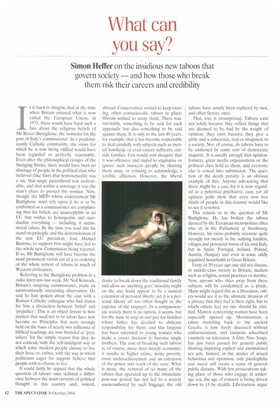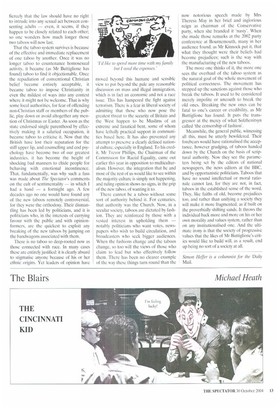What can you say?
Simon Heifer on the insidious new taboos that govern society — and how those who break them risk their careers and credibility
It is hard to imagine that at the time when Britain entered what is now called the European Union, in 1973, there would have been such a fuss about the religious beliefs of Mr Rocco Buttiglione, the nominee for the post of Italy's commissioner. In a predominantly Catholic community, the views for which he is now being vilified would have been regarded as perfectly reasonable. Even after the philosophical ravages of the Swinging Sixties, there would have been no shortage of people in the political class who believed (like him) that homosexuality was a sin, that single parenthood was undesirable, and that within a marriage it was the man's place to protect the woman. Now, though, the MEPs whose endorsement Mr Buttiglione must rely upon if he is to be confirmed as a commissioner are complaining that his beliefs are unacceptable in an EU that wishes to homogenise and standardise everything — including, it seems, moral values. By the time you read this his stand on principle and the determination of the new EU president, Jose Manuel Barroso, to support him might have led to the whole new Commission being rejected. If so, Mr Buttiglione will have become the most prominent victim yet of a re-ordering of the whole system of taboos in much of Western civilisation.
Referring to the Buttiglione problem in a radio interview last week, Mr Neil Kinnock, Britain's outgoing commissioner, made an unintentionally interesting observation. He said he had spoken about the case with a Roman Catholic colleague who had drawn for him a distinction between 'belief and 'prejudice'. This is an object lesson in how matters that used not to be taboo have now become so. Principles that were strongly held on the basis of nearly two millennia of biblical teachings are now branded as 'prejudices' for the simple reason that they do not coincide with the self-indulgent way in which some modern people choose to live their lives; or, rather, with the way in which politicians eager for support believe that people wish to choose to live.
It could fairly be argued that the whole question of taboos once defined a difference between the main currents of political thought in this country and, indeed, abroad. Conservatives wished to keep existing, often centuries-old, taboos in place; liberals wished to scrap them. There was, inevitably, something to be said for each approach; but also something to be said against them. It is only in the last 40 years, for example, that it has become respectable to deal candidly with subjects such as mental handicap, or even cancer sufferers, outside families. Few would now disagree that it was offensive and stupid to stigmatise or ignore such innocent people by shutting them away, or refusing to acknowledge a terrible affliction. However, the liberal desire to break down the traditional family and allow an 'anything goes' morality might on the one hand appear to be a natural extension of personal liberty; yet it is a personal liberty all too often bought at the expense of the taxpayer. In a compassionate society there is no option, it seems, but for the state to step in and pay for families whose father has decided to abdicate responsibility for them; and this largesse has been extended to young women who make a career decision to become single mothers. The cost of breaking such taboos is, of course, more than merely economic: it results in higher crime, more poverty, more underachievement and an extension of the power and reach of the state. What is more, the removal of so many of the taboos that operated up to the immediate post-war period has not led to a society unencumbered by such baggage; the old taboos have simply been replaced by new, and often fiercer, ones.
That, too, is unsurprising. Taboos exist not solely because they reflect things that are deemed to be bad by the weight of opinion; they exist because they give a unity and a coherence, real or imagined, to a society. Nor, of course, do taboos have to be endorsed by some sort of democratic majority. It is usually enough that opinionformers, great media organisations or the political class hold to them, and everyone else is cowed into submission. The question of the death penalty is an obvious example of this. Anyone advocating that there might be a case for it is now regarded as a potential psychiatric case; yet all opinion polls show that even now two thirds of people in this country would like to see it restored.
This returns us to the question of Mr Buttiglione. He has broken the taboos decreed by the European metropolitan elites who sit in the Parliament at Strasbourg. However, his views probably resonate quite strongly not merely in the outlying hamlets, villages and provincial towns of his own Italy, but in Spain, Portugal, Ireland, Poland, Austria, Hungary and even in some oddly regulated households in Great Britain.
Forty or 50 years ago one did not discuss, in middle-class society in Britain, matters such as religion, sexual practices or income. Now, anyone who shies away from these subjects will be condemned as a prude. Many might regard this as a liberation; others would see it as the ultimate invasion of a privacy that they feel is their right, but to which others feel no one should be entitled. Matters concerning women have been especially opened up. Menstruation, a taboo stretching back to the ancient Greeks, is now freely discussed without embarrassment, and tampons advertised routinely on television. A film, Nine Songs, has just been passed for general public showing depicting explicit and unsimulated sex acts. Indeed, in the matter of sexual behaviour and openness, only paedophilia and incest still retain a sense of general public distaste. With few prosecutions taking place of those who engage in underage sex, the age of consent is being driven down to 14 by stealth. Libertarians argue fiercely that the law should have no right to intrude into any sexual act between consenting adults — even, it seems, if they happen to be closely related to each other; so one wonders how much longer those two taboos will now last.
That the taboo system survives is because of the effective and immediate replacement of one taboo by another. Once it was no longer taboo to countenance homosexual activity, it became (as Mr Buttiglione has found) taboo to find it objectionable. Once the repudiation of conventional Christian belief became entirely acceptable, it became taboo to impose Christianity in even the mildest of ways into any context where it might not be welcome. That is why some local authorities, for fear of offending non-Christian staff or members of the public, play down or avoid altogether any mention of Christmas or Easter. As soon as the state endorsed single parenthood by effectively making it a salaried occupation, it became taboo to criticise it. Now that the British have lost their reputation for the stiff upper lip, and counselling and cod psychology have become two of our greatest industries, it has become the height of shocking bad manners to chide people for behaving with emotional incontinence. That, fundamentally, was why such a fuss was made about The Spectator's comments on the cult of sentimentality — in which I had a hand — a fortnight ago. A few decades ago no one would have found any of the new taboos remotely controversial, for they were the orthodoxy. Their dismantling has been led by politicians, and it is politicians who, in the interests of currying favour with the public and with opinionformers, are the quickest to exploit any breaking of the new taboos by jumping on the bandwagons associated with them.
There is no taboo so deep-rooted now as those connected with race. In many cases these are entirely justified: it is clearly absurd to stigmatise anyone because of his or her ethnic origins. Yet leaders of opinion have
moved beyond this humane and sensible view to put beyond the pale any reasonable discussion on mass and illegal immigration, which is in fact an economic and not a race issue. This has hampered the fight against terrorism. There is a fear in liberal society of admitting that those who now pose the greatest threat to the security of Britain and the West happen to be Muslims of an extreme and fanatical bent, some of whom have lethally practical support in communities based here. It has also prevented any attempt to preserve a clearly defined national culture, especially in England. To his credit, Mr Trevor Phillips, the Chairman of the Commission for Racial Equality, came out earlier this year in opposition to multiculturalism. However, the integration that he and most of the rest of us would like to see within the majority culture is simply not happening, and ruling opinion shows no signs, in the grip of the new taboo, of wanting it to.
There cannot be a taboo without some sort of authority behind it. For centuries, that authority was the Church. Now, in a secular society, taboos are dictated by fashion. They are reinforced by those with a vested interest in upholding them — notably politicians who want votes, newspapers who wish to build circulation, and broadcasters who seek bigger audiences. When the fashions change and the taboos change, so too will the views of those who claim to lead but who effectively follow them. There has been no clearer example of the way these things turn round than the now notorious speech made by Mrs Theresa May in her brief and inglorious reign as chairman of the Conservative party, when she branded it 'nasty'. When she made those remarks at the 2002 party conference at Bournemouth, many in her audience found, as Mr Kinnock put it, that what they thought were their beliefs had become prejudices; such is the way with the manufacturing of the new taboos.
The more one thinks of it, the more one sees the overhaul of the taboo system as the natural goal of the whole movement of political correctness. The movement has stepped up the sanctions against those who break the taboos. It used to be considered merely impolite or uncouth to break the old ones. Breaking the new ones can be fatal to one's career or credibility, as Mr Buttiglione has found. It puts the transgressor at the mercy of what Solzhenitsyn called 'the censorship of fashion'.
Meanwhile, the general public, witnessing all this, must be utterly bewildered. Their forebears would have rationalised the acceptance, however grudging, of taboos handed down by the Church on the basis of scriptural authority. Now they see the parameters being set by the editors of national newspapers, the news editors at the BBC, and by opportunistic politicians. Taboos that have no sound intellectual or moral rationale cannot last, for they are not, in fact, taboos in the established sense of the word. They, like faiths of old, become prejudices too, and rather than unifying a society they will make it more fragmented, as if built on the proverbially shifting sands. It throws the individual back more and more on his or her own morality and values system, rather than on any institutionalised one. And the ultimate irony is that the society of progressive values that the likes of Mr Buttiglione's critics would like to build will, as a result, end up being no sort of a society at all.
Simon Heifer is a columnist for the Daily Mail.



















































































































 Previous page
Previous page